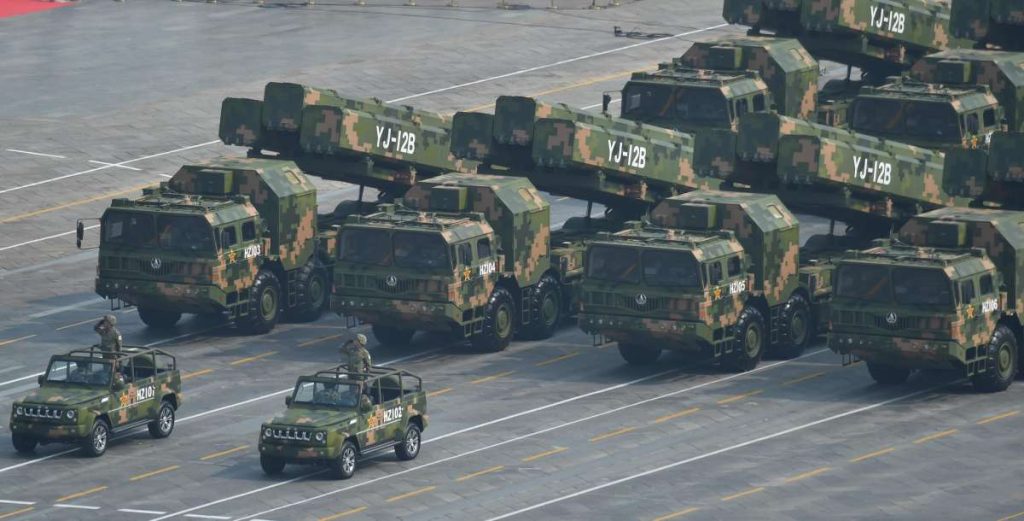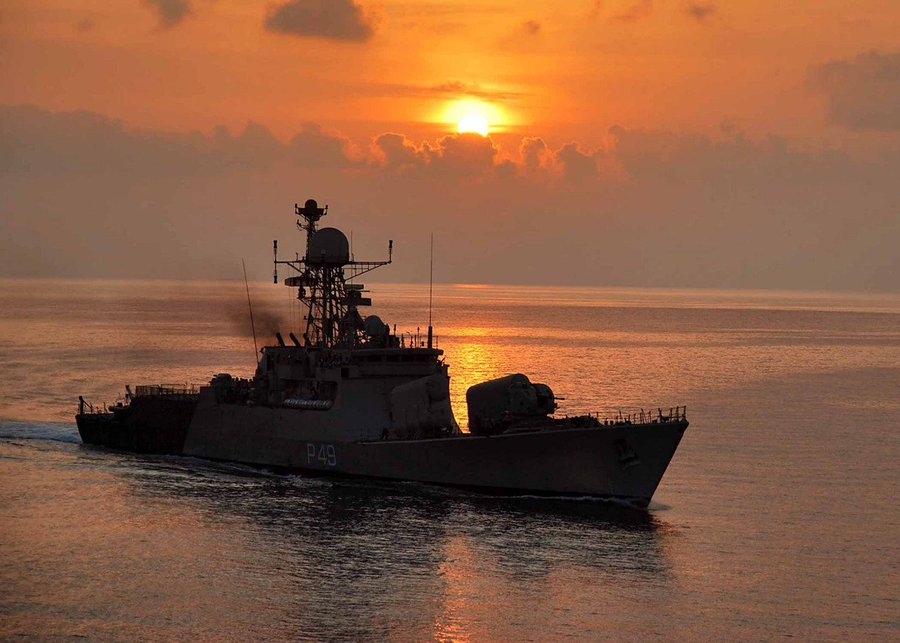Amidst tensions, Chinese citizens advocate peaceful means for China-Taiwan unification, preferring status quo if peaceful resolution isn’t feasible….reports Asian Lite News
The ‘unification’ of Taiwan with mainland China is not the main priority for many Chinese people, and around one-third consider launching a full-scale war on the self-ruled island “unacceptable,” Al Jazeera reported.
But, even though the people’s focus remains underpinned on the economy and other crucial fronts, the Taiwan issue will remain the ‘cornerstone’ of the Chinese Communist Party’s narrative.
The communists won the Chinese Civil War in 1949, and the nationalists of the Kuomintang (KMT) fled Beijing for the island of Taiwan. It was on Kinmen, the main island of the archipelago of the same name, less than 10 km (6.2 miles) from the coast of China, that the nationalists repulsed repeated communist invasion attempts, but not before the fighting had wreaked havoc on both Xiamen and Kinmen, Al Jazeera reported.
Kinmen and its outlying islets – some of which lie even closer to the Chinese coast – have been a part of Taiwan’s territory ever since.
Chinese citizens were once able to get tourist visas to visit the islands, but that ended with the pandemic.
“It is difficult to imagine that this used to be a warzone,” 23-year-old Shao Hongtian said. “Kinmen, China and Taiwan are all part of the same nation, so it should be possible to visit, and I hope I can visit one day.”

Like Shao, Chinese President Xi Jinping and the ruling Chinese Communist Party (CCP) too claim that Taiwan and its territory are part of China.
Xi said in his New Year’s address that China’s unification with democratic Taiwan was an “historical inevitability,” and China has not ruled out the use of force to achieve unification. Last year Xi called on China’s armed forces to strengthen their combat readiness.
In recent years, the Chinese military has increased its pressure on Taiwan with almost daily airborne and maritime incursions close to Taiwan’s air and sea space. This further intensified after the visit of former House Speaker Nancy Pelosi to Taipei.
At times, the Chinese manoeuvres have been accompanied by sabre-rattling rhetoric and large-scale military drills.
Lately, tensions have also been rising near Kinmen.
Last month, two Chinese fishermen were killed when their speedboat capsized as they attempted to flee the Taiwanese coastguard when they were discovered fishing “within prohibited waters” about one nautical mile (1.8km) from the Kinmen archipelago, Al Jazeera reported.
Since then, the Chinese coastguard has stepped up its activities around Kinmen.
Zhu Fenglian, a spokesperson for the Chinese government’s Taiwan Affairs Office, called the February incident “vicious” and stressed the waters were “traditional” fishing grounds for fishermen in China and Taiwan. There were no off-limits waters around Kinmen, she added.
A second capsize was reported on Thursday, and on this occasion, China asked for help from the Taiwan coastguard.
But, despite the recent tensions, Chinese citizen Shao says hostilities are not the way to bring China and Taiwan together.
“I want unification to happen peacefully,” he said. He said that if that is not possible, it would be better to keep things as they are.
He knows that many of his friends feel the same way. According to Shao, if they go to Kinmen and Taiwan, it should be as visitors, not as fighters.
“The Taiwanese haven’t done anything bad to us, so why should we go there to fight them?” he said, convinced that any war between China and Taiwan would result in significant casualties on both sides. “Unification with Taiwan is not worth a war.”
According to Al Jazeera, a study published by the University of California San Diego’s 21st Century China Center last year suggests that Shao and his friends are not alone in opposing a war over Taiwan.

The study explored Chinese public support for different policy steps regarding unification with Taiwan and it was found that one-third of Chinese respondents termed launching a full-scale war to achieve unification as “unacceptable.”
Only one per cent rejected all other options but war, challenging the Chinese government’s assertion that the Chinese people were willing to “go to any length and pay any price” to achieve unification, Al Jazeera reported.
Mia Wei, a 26-year-old marketing specialist from Shanghai is not surprised by such results.
“Ordinary Chinese people are not pushing the government to get unification,” she said. “It is the government that pushes people to believe that there must be unification.”
At the same time, support for a unification war turned out to be close to the same level found in similar studies from earlier years, indicating that despite the growing tension in the Taiwan Strait and renewed talk about taking control of Taiwan, there has not been a corresponding increase in support for more forceful measures.
Wei believes that Chinese like herself are more concerned with developments inside their country, amid issues like property crisis and economic concerns.
“First there was Covid, then the economy got bad and then the housing market got even worse,” she said. “I think Chinese people have their minds on more important things than unification with Taiwan.”
However, regardless of what Chinese people might think, Eric Chan, a senior fellow at the Global Taiwan Institute in Washington, DC believed that unifying Taiwan with the mainland will remain a ‘cornerstone’ of the CCP’s narrative.
“Unification is not a topic that is up for any sort of debate with the general public,” he said.
Although the Chinese leadership often claims that China is a democratic country where the party is guided by the will of the Chinese people, there are no regular national elections or free media, and online discourse is restricted and regularly censored. Speaking out against the CCP can also result in criminal convictions.
Since Xi became president in 2012, crackdowns on civil liberties have intensified, and Xi has centralised power around himself to a degree unprecedented since the rule of Mao Zedong – the man who led the communists to victory against the nationalists and became communist China’s first leader, Al Jazeera reported.
During Mao’s rule, reforms and purges of Chinese society led to the deaths of millions of Chinese people, while over 4,00,000 Chinese soldiers died as a result of his decision to enter the 1950-1953 Korean War on North Korea’s side.
But according to Chan, the days when a Chinese leader could expend tens of thousands of lives in such a manner are over. Recent government actions that exacted a heavy toll on citizens led to public pushback, and Xi did not appear immune.
During the Covid pandemic, Xi ardently defended the country’s zero-COVID policy even though its mass testing and strict lockdowns had dire socioeconomic consequences. The government eventually abandoned the policy as the economy sank, and people took to the streets across China’s major cities demanding an end to the lockdowns, even calling for Xi to step down, Al Jazeera reported.
As for war, the circumstances are also different. A battle for Taiwan would be existential for the communist party and Xi, according to Chan.
According to Chan, the public outrage over a long unification war that might even end in a Chinese defeat could ‘endanger’ the party’s rule. So, he expects the CCP instead continuing to engage in low-cost grey zone operations against Taiwan while developing a Chinese military that would be able to score a swift victory.
For citizens like Shao, however, any attempt to settle the issue through conflict would be a disaster.
“I don’t think it will end well for anyone – not for those that have to fight it and not for the government that starts it,” he said. (ANI)
ALSO READ: China’s Kinmen Coup: Experts Decode Tactical Intrusion

Leave a Reply